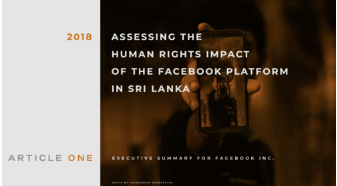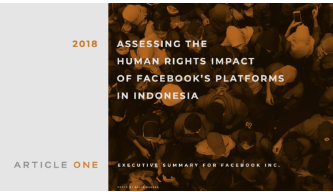
CHALLENGE: FACEBOOK INC. PARTNERED WITH ARTICLE ONE TO SURFACE AND MITIGATE RISKS RELATED TO ITS PLATFORMS IN SRI LANKA AND INDONESIA.
We benefit greatly from our work with Article One. Article One’s clarity and commitment have delivered the actionable insights we need.
— Miranda Sissons, Director of Human Rights, Facebook
APPROACH
Article One’s country-level human rights impact assessment methodology was informed by guidance from the UNGPs and the GNI Principles as well as Article One’s award-winning methodology for, and experience in, conducting human rights impact assessments around the world. The assessment included five key steps: 1) Country Review, 2) Stakeholder Mapping, 3) Country-Visit, 4) International Engagement, and 5) Report Drafting.
The methodology emphasized the voices of rightsholders potentially impacted by Facebook and their legitimate representatives. As such, special attention was paid to ensuring direct engagement with civil society organizations, journalists, academics and human rights defenders.
Article One applied the approach outlined in the UNGPs to determine the saliency of and Facebook’s responsibility for the potential impacts that surfaced during the assessment. To determine the relative priority of salient human rights impacts, Article One assessed the scale, scope, and remediability of impacts.
Article One then developed a series of recommendations to support Facebook in maximizing its positive human rights impacts and mitigating its adverse impacts in both countries.
FINDINGS
We recognize and commend Facebook for taking a bold and meaningful step in making the findings of these human rights assessments public. If you would like to review the findings and recommendations from the country-level assessments, please download the executive summaries below.

Sri Lanka HRIA
Executive Summary

Indonesia HRIA
Executive Summary
IMPACT
Facebook engaged robustly in the HRIA process and implemented numerous recommendations we proposed. In doing so, the company has made significant strides in addressing the impacts of its products and respecting the rights of users and others impacted in each country. Specific changes Facebook made in response to our recommendations include:
-
Corporate policies, including the creation of a new policy to enable the removal of verified misinformation that contribute to the risk of imminent offline physical harm and the expansion of a bullying policy to increase protections to all individuals, not just children.
-
Operational-Level engagement, including launching Third Party Fact Checkers, expanding Trusted Partner networks, and hiring a new Human Rights Director.
-
Product interventions including increasing friction for sharing problematic content across the platform, new content demotions and improved reporting/blocking tools for Facebook’s Messenger app.
For a full list of actions taken, please see Facebook’s response to our assessments.